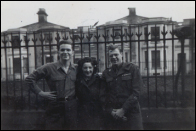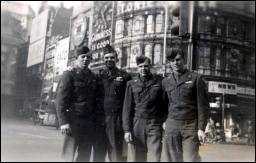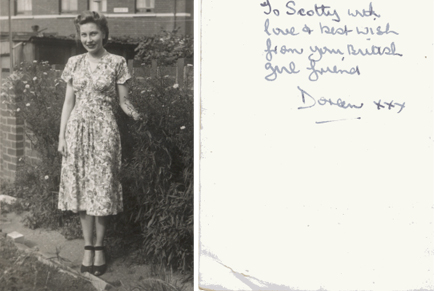 |
England

We were driven to LeHarve and spent one or two days there in camp while the new students were being collected. During this time I met a friend of mine from high school, Joe Kebelmen, from the 82nd Parachute Division, also going to Shrivenham. We then all boarded a boat and crossed the English Channel in a calm sea arriving, I think, in Southampton and going by train to Shrivenham. The "University", including our "dormitories", was formally a British Officer's Training School. It was a comfortable, not luxurious by any means, and we soon settled in.
It was an extremely enjoyable and valuable experience. I met another high school friend from Rockville Centre, Bob Jones, and along with several other students we had a nice group of buddies. Bob also met a friend of his, Ralph Smith from his pre-enlistment Dartmouth days. His middle name was "Kitchell". It seems his father had a best friend named Kitchell from New Jersey. That had to be a relative of mine.
 | |  |
Ralph Kitchell Smith, Ray Kitchell, Bob Jones and friends |
My courses were "Introduction to Journalism", "American History" and "Public Opinion", freshmen and sophomore level courses. The instructors were college professors already in the service or contracted with and brought over from the States. The ones I had were excellent. I enjoyed my courses getting much more a lift out of them than I had in engineering.
I also enjoyed being in England, the origin of the Kitchell family (Kent). With Joe Kebelmen, we would sometimes takeoff on a weekend exploring the countryside, wherever the bus would take us. I had studiously learned the subdivision of the English pound into coins and when we first got on the bus, I asked the driver how much. He replied "tuppence and hay" (two and a halfpennies) and I didn't have a clue what he was saying. I held out my hand full of change and he picked out the fare, something he was used to by now. We had heard about a fabulous place in London catering to GIs and serving steak and French fries so, when we first visited London, we headed there and had great meal at an affordable price. A week a two later I read in The Stars and Stripes that the restaurant had been closed for serving horsemeat to the Yanks. Food was still short but the English shared what they had when it came to restaurants, especially in London. One thing I remember fondly were the street vendors selling "fish and chips" served in old, folded newspaper pages. I love it to this day and often ask my wife to make it but she claims it's too messy to cook. Ah. We visited most of the historic sites and tried to make some female acquaintances but those we met wanted to be paid. Oxford, a pleasant place best know for its old and prestigious university, was nearby and frequently visited by our fellow students and us. Female acquaintances were struck up, in Shrivenham and Oxford, some of them eventually leading to marriages.
The coursework convinced me that I wanted to be a journalist, particularly a foreign correspondent. My professor, a Captain in the Army, had been on the faculty of the McDill School of Journalism at Northwestern before the war, one of the best in the country. I asked him for advice on where to enroll in a good university for both journalism and political science (he suggested the later if I wanted to be a foreign correspondent. I wanted it to be near but not too close to Long Island and my mother, and also co-educational--enough of separation from the fairer sex. He promptly advised me to look into Syracuse University in upstate New York. Shortly after that I took an action did what turned out to be very smart and fortuitous. Reading in the Stars and Stripes that because of the GI Bill it was anticipated most US universities and colleges would be overwhelmed with applicants, interested soon-to-be vets were advised to contact the college of their choice as soon as possible to guarantee a place. I sat right down and wrote Syracuse (SU). I soon received a letter from my mother telling me they had written her requesting my high school academic records and instructed me to visit them as soon as possible after my discharge. SU was one of many universities and colleges who went all out to accommodate the returning veterans and its enrollment soon ballooned from a prewar attendance of about 5,000 to close to 20,000 at the height of the immediate post-war surge. This involved many hardships, delays and inconveniences for some GIs and their wives. Many spent their freshman and/or sophomore years' off-campus, e.g., at Sampson Naval Base before there was sufficient room on-campus, or in near-campus former military barracks. All of us took at least several courses in temporary, prefabricated classrooms. After taking their entrance exam, and given my ASTP and Shrivenham credits, I started on campus and in a regular student dorm, in May 1946 (about a month after my discharge) as a second term sophomore. Although it wasn't rank, I did get something valuable out of my army service. The GI Bill turned my life around and was the foundation of my subsequent professional career.
One weekend, Bob, Ralph and I took the train (free) for a weekend in Cardiff, Wales. The train was crowded, as usual, and we were all standing in the aisle adjoining the compartments (in the European style). As we approached Cardiff, a pretty Welch woman boarded and Ralph, a rather handsome and smooth character, soon struck up a conversation and made a date for that night. She also had a girlfriend who she suggested might also be interested (for protection, I suspect) and I quickly volunteered. While we certainly enjoyed Cardiff, the company of two comparatively mature and pretty ladies outshined the city sights, at least for me. My blind date was named Doreen Jones, can't get more Welsh than that. She was several years older than I was and, after the death of her father, has recently been discharged from the WAFs (Women Air Force Auxiliary or something close to that) to care for her invalid mother. While not an overwhelming beauty, she was very attractive and sweet person, in depth as I soon learned.
My only serious, wartime romance was about to begin. From then on, every weekend I traveled to Cardiff and saw her, at some cost and inconvenience to me as I was still in school. It is not shocking to think that a barely 21 year old kid at the end of the war would fall in love with a pretty British girl and want to get married and I began pursuing her in earnest. It was also not unpleasant for her to be courted by a (handsome?) Yank and to have some fun and emotions after years of wartime service under severe conditions. As the time approached when my assignment to the Shrivenham program would end and I would be returned to an Army unit on the continent, I proposed marriage and was not immediately refused. But it was truly a difficult decision for her. Despite all the current allure of marrying a Yank, which swept many young British girls off their feet (some to their later regret), Doreen had an invalid mother whom she would not leave and worried about the consequences of taking her to a strange country at her age. The last time I saw Doreen she was sick in bed with a bad cold and we were both sincerely sad that we would soon be separated. While we never had any sexual relations, there was a bond or attraction and affection between us that I believe lasted for many years after augmented by occasional correspondence, even with my mother. While we left the possibility of marriage open before I left Europe or shortly after I returned to the States, when I actually left we both knew deep down inside that she was not going to be able to take all the risks involved. Such is life.
 |
|
<< A Time for Decision |
Austria >>
|
 |




